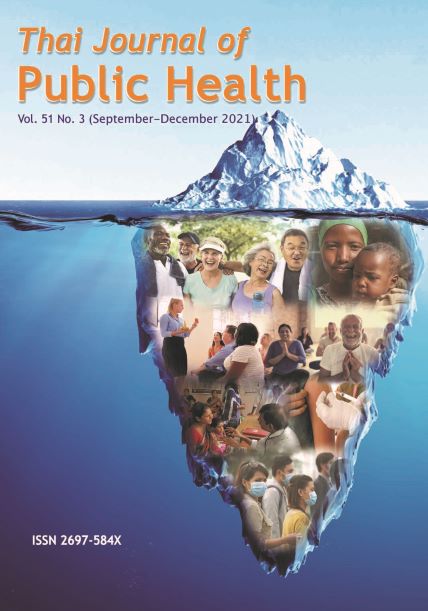Effect of a Program to Enhance Health Literacy and Self-Efficacy in Assisting Smoking Cessation among Village Health Volunteers in Samut Songkhram Province, Thailand
Keywords:
Village health volunteers, Health literacy, Self-efficacy, Smoking cessationAbstract
Smoking is a risk factor to health and an important cause of disease and premature death, especially among adolescents and patients with non-communicable diseases. It is an important public health problem in countries around the world, including Thailand. Cigarettes contain about 600 ingredients. When the ingredients burn, they generate more than 7,000 chemicals, 25 of which are harmful to health and at least 70 of them are linked to cancer. Smoking can lead to a variety of ongoing complications in the body. Tobacco smoke is incredibly harmful to health, while smoking can increase the risk of a variety of problems over several years. Some of the bodily effects are immediate, such as mood stimulation, anxiety and irritability, smelly hair, unhealthy teeth, yellow fingers, bronchitis, poor vision, dull sense of smell and taste, persistent coughing, and loss of appetite. Others have a long-term effect, for instance, the nicotine in cigarettes increases heart rate and blood pressure, carbon monoxide inhibits oxygen circulation in the body, and smoking is associated with diseases such as cancer, hypertension and hypertension complications, diabetes mellitus and diabetes complications, dyslipidemia, immune dysfunction, infertility, heart disease, constricted blood vessels, and chronic obstructive pulmonary disease (COPD). At present, smoking is also a risk factor of coronavirus infection (COVID-19).
Village health volunteers (VHVs) are health workers that play important roles, and constitute an important workforce in tobacco control. They facilitate smoking cessation in a community. Promotion of health literacy and self-efficacy among VHVs regarding the harmful effects of tobacco; toxins in tobacco smoke; and techniques, skill training, benefits and media literacy about assisting people to stop smoking, could promote VHVs confidence in assisting with smoking cessation. Therefore, health literacy and self-efficacy of VHVs in assisting people with smoking cessation should be improved to promote successful smoking cessation in the community.
The purpose of this quasi-experimental research was to examine the effect of a program designed to enhance health literacy and self-efficacy in providing assistance with smoking cessation among VHVs in Samut Songkhram Province, Thailand. The study involved VHVs (n=60), divided into the experimental group and comparison group. Participants in the experimental group received five weekly sessions of the enhancement program on health literacy and self-efficacy in assisting with smoking cessation. The comparison group received educational material about tobacco control. Data were collected using a questionnaire at pretest and posttest, and analyzed by using a paired t-test and independent t-test.
The research findings showed that after the intervention, mean scores in: cognitive skill in assisting with tobacco and smoking cessation; skill in accessing health data; skill in communicating health data; decision-making skills, self-management, and media literacy to assist with smoking cessation; along with self-efficacy and smoking cessation assistance behavior, were significantly higher in the experimental group than in comparison group and significantly higher than at pretest (p <0.05).
The findings of this study suggest that learning and seeing the success of other people can also change behavior to assist with smoking cessation and increase health literacy of VHVs. This program can promote health literacy and self-efficacy in assisting people with smoking cessation among VHVs, and can help smokers to stop smoking.
References
World Health Organization. Tobacco. Available from https://www.who.int/health topics/tobacco#tab=tab_1, accessed 5 May, 2019.
Pitayarangsarit S, Punkrajang P. Report on tobacco consumption in Thailand 2018. Bangkok: Charoendeemonkong Printing; 2018. (In Thai)
Pausawasdi S. Thai health professional alliance against tobacco. Bangkok: Healthworks. Co., Ltd; 2016. (In Thai)
Tobacco Control Bureau. Tobacco control network. Available from http://btc.ddc.moph.go.th/th/links.php?id=2, accessed 5 May, 2019. (In Thai)
Ministry of Public Health. 3 million 3 years Smoking Cessation in Thailand for King. Available from http://www.quitforking.com/, accessed 5 May, 2019. (In Thai)
Primary Health Care Division. Village health volunteers. Available from http://phc.moph.go.th/www_hss/data_center/dyn_mod/Guideline_VHV.4.0.pdf, accessed 5 May, 2019. (In Thai)
Primary Health Care Division. Guideline for developing VHVs 4.0. Available from http://phc.moph.go.th/www_hss/content.php?Submit=Clear&ID_Dyn, accessed 5 May, 2019. (In Thai)
Ruamsook T, Tipwong A, Karuhadej P. Associations between health literacy and smoking cessation assistance behavior among village health volunteers, Amphawa District, Samut Songkhram Province. Journal of Public Health Nursing 2019; 33: 37-50. (In Thai)
Nutbeam D. Health literacy as a public health goal: A challenge for contemporary health education and communication strategies into the 21st century. Health Promotion International 2000; 15(3): 259-67.
Prasartsilapa T, Phetpradab S. Village health volunteers and family members to smoking cessation campaigns, Pattanee Province. Available from http://www.tcr.or.th/ trcresearch/subpage/RP/TRC_Re_51-01-02-10.pdf, accessed 5 May, 2019. (In Thai)
Health Education Division. Health literacy. Bangkok: New Thammada Printing; 2012. (In Thai)
Bandura A. Self-efficacy: Towards a unifying theory of behavioral change. Psychological Review 1997; 84(2): 191-215.
Cohen J. Statistical power analysis for the behavioral sciences. Hillsdale, New Jersey: Lawrence Erlbaum Associates; 1988.
Ruamsook T, Kalampakorn S, Rawiworrakul T. The effect of smoking cessation program by applying the Protection Motivation Theory in patients with hypertension. Thai Journal of Nursing 2018; 67(1): 1-10. (In Thai)
Lumrod N, Kalampakorn S, Sillabutra J. Effects of a capacity building program on health literacy in smoking cessation on village health volunteers in Pathum Thani Province. Journal of Health Science Research 2019; 13(1): 84-94. (In Thai)
Sonthitham K, Chamusri S. Effects of a self-efficacy promoting program on caring for pre-hypertension group among community health volunteers. Journal of the Royal Thai Army Nurses 2020; 21(2): 102-10. (In Thai)
Downloads
Published
Issue
Section
License
Creative Commons License CC-BY-ND


